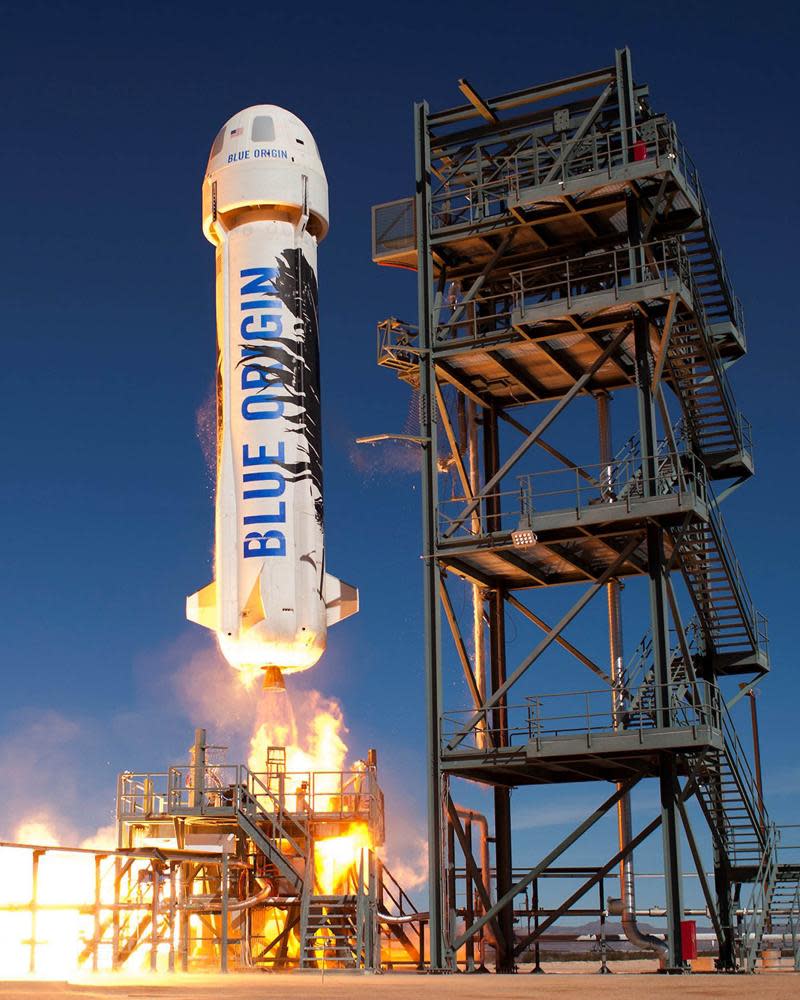Jeff Bezos’s vision of life among the stars won’t mend a broken world

So Jeff Bezos made it safely back to the universe that most of us lesser mortals inhabit. He graciously thanked his Amazon employees and customers (that’s you and me, folks) who made the realisation of his childhood Star Trek dreams possible. “I want to thank every Amazon employee and every Amazon customer because you guys paid for this,” he said. “Seriously, for every Amazon customer out there and every employee thank you from the bottom of my heart very much. It’s very appreciated.”
Aw, shucks. Thanks, Jeff. In a post-flight press conference he declared that the venture had reinforced his commitment to tackling the climate crisis and using his project as a stepping stone towards colonising space for the benefit of Earth. “We’re going to build a road to space,” he said, “so our kids, and their kids, can build the future. This is not about escaping Earth … this is the only good planet in the solar system and we have to take care of it. When you go to space and see how fragile it is you want to take care of it even more.”
Now I know that, as Oscar Wilde famously observed, consistency is the last refuge of the unimaginative, but can we unpack this rhetoric a bit? Is this the same Jeff Bezos, for example, who founded (and, until recently, ran) a company that – according to some reports – threatened to fire employees who were speaking out about the company’s role in the climate crisis? And then there’s the internal contradictions: it’s not about “escaping Earth”, for example, but about building “a road to space” with the aim of “colonising” it for the benefit of our precious planet. Is there a business model lurking here somewhere? Mining asteroids for rare-earth metals? Wilde was right: consistency is just for lesser beings.
Digital technology is not a weightless magic wand, but an activity that has a significant environmental footprint
Back on Earth, meanwhile, the tech industry has become very interested in the climate crisis, and tech solutionism – the belief that for every complex problem there is a technical solution – is running riot. The silver bullet du jour is “AI” – which is actually a cunning euphemism for an interesting but often flaky technology called “machine learning”. This, say the boosters, could be humanity’s answer to the climate crisis, or at any rate has the potential to slow down our race towards the precipice.
How come? Well, it could: improve predictions of electricity demand; optimise how freight is routed; make electric vehicles (EVs) more efficient; reduce the energy consumption of buildings by taking weather, occupancy, work patterns etc into consideration; optimise supply chains; monitor deforestation; nudge consumers into greener consumption. And so on.
On closer inspection, even if these good things were to come to pass, they are all potential applications, and probably incremental ones at best. They could conceivably make our current ways of living a bit less environmentally damaging. But you don’t have to be a genius – or even a machine-learning specialist – to realise that the quickest route to climate disaster is a continuation of business as usual, even with added machine learning.

The bigger problem, though, is the way solutionism chooses to ignore an awkward fact: that digital technology is not a weightless magic wand, but an activity that itself has a significant environmental footprint. In fact, as the Microsoft researcher Kate Crawford puts it in her path-breaking Atlas of AI, it’s more accurately seen as an extractive industry. “The creation of contemporary AI systems,” she writes, “depends on exploiting energy and mineral resources from the planet, cheap labour, and data at scale.”
And this is not just about the electricity demands of vast server farms, although that in itself is significant. It’s about the mining of lithium and rare-earths in various parts of the world (including some conflict zones), huge amounts of (often underpaid) human labour, the appropriation of personal data and invasion of privacy on a planetary scale, the pollution of the public sphere, undermining of electoral processes, and the ratcheting up of planned obsolescence to a level never before seen in industrial history. And to add to it all, there’s the astonishing energy requirements of the machine-learning systems that are currently the poster children of “AI”. CO2 emissions from the computation involved in training a large machine-learning model of the kind used by Google were estimated at 281,000kg of CO2 – five times the lifetime emissions of an American car, including emissions from its manufacture.
None of this implies that machine-learning technology will not be useful in mitigating some of our current environmentally damaging activities. It’s just that we need to weigh the environmental costs against the putative benefits of a tech solution. But those who tout “AI” as a silver bullet for our environmental crisis are – as Mr Bezos temporarily was – not properly earthed.
What I’ve been reading
Danger, Will Robinson
Lost in Space. Splendid Boston Review article by Alina Utrata on the Bezos/Musk/Branson obsession with space exploration.
Tomorrow’s world
Kim Stanley Robinson on “how science fiction works”. Transcript of a fascinating interview on the Public Books site.
Speak your mind
The Left Needs Free Speech. Perceptive essay by Katha Pollitt in Dissent magazine. TL;DR version: what’s sauce for the “woke” goose is also sauce for the authoritarian gander.

 Yahoo Finance
Yahoo Finance 